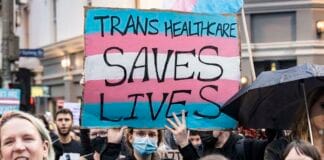IN EARLY May, the Rudd government threatened to overturn the proposed civil unions bill for same-sex couples in the ACT, breaking a key election promise not to block the legislation and surprising many who expected progressive queer rights legislation from Labor.
The ACT Labor government has now abandoned the bill for the “Civil Partnerships Act”, which allows couples to “register” their partnership but does not allow legally binding ceremonies. They’re the sticking point for Rudd and McClelland: “we believe such ceremonies would mimic marriage and therefore undermine the Marriage Act.”
However, it’s ok to mimic John Howard’s policy handbook. Rudd’s repetition of Howard’s mantra that marriage is “traditionally between a man and a woman” continues the promotion of homophobia by the former government. As activist Rodney Croome has commented, “traditionally, there was slavery and traditionally women didn’t get the vote”.
While Rudd’s promised removal of 100 laws that discriminate against same-sex couples in areas like tax and workers’ compensation (the result of some pressure from the LGBTIQ movement) is a step forward, the discrimination could have been easily removed by allowing queers to marry and form recognised de-facto relationships.
While marriage is not the hallowed institution conservatives would have us believe, the Howard government’s same-sex marriage ban of 2004 and then its overriding of the ACT’s first attempt to introduce civil unions in 2006 represented state-sanctioning of homophobia.
The fight for civil unions and marriage for same-sex couples is a fight against this: and it’s time for the movement to step up the pressure. The LGBTIQ community needs to unite around clear demands and make links with broader forces. The national day of action for same-sex marriage and civil unions, on August 3, is a step towards that. Various state-based Gay and Lesbian Rights Lobbies, AIDS councils and some unions have already signed on in support.
by Amy Thomas




